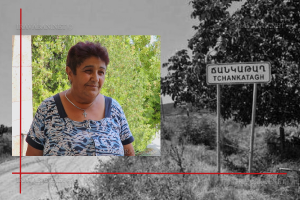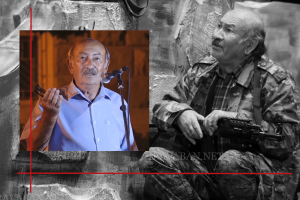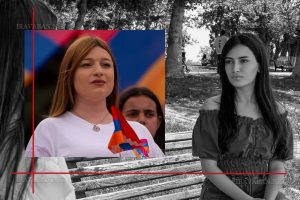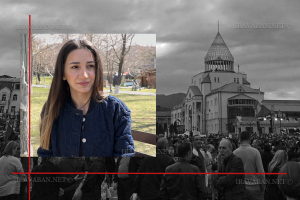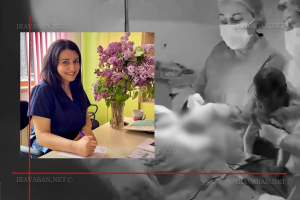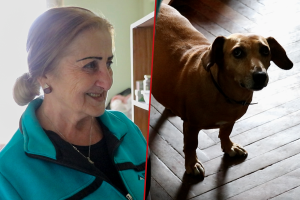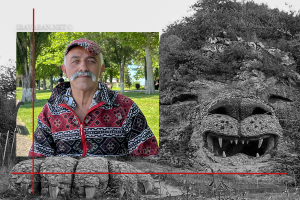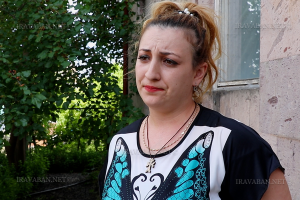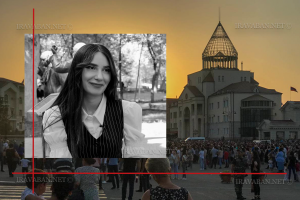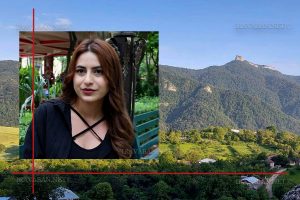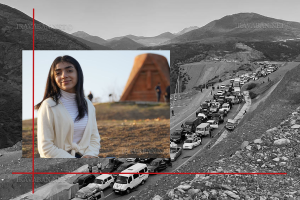Shogher Sargsyan, who was forcibly displaced from the occupied Republic of Artsakh, told in the framework of “Artsakh: Armenian Genocide 2023. Stories of Survivors” documentary project of Iravaban.net that during the 44-day war unleashed by the enemy on 27 September, 2020, her family had to be divided into two parts.
“Immediately after the end of the war, we returned to Artsakh to celebrate the New Year in our home, with the whole family, despite all the events. I well remember the first time we passed that road; we were accompanied by Russian peacekeepers. We had to show our passports to enter the house. It was hard and humiliating, but we were coming home. After the war, it became clearer for me and my family how much value the motherland is and how much you have to work for the motherland. After the war, my family tried to improve the city as much as they could, to contribute to the preservation of Artsakh. I tried to preserve Artsakh culture, theater, and television in the scope of my profession,” she says.
Immediately after the war, the Shogher’s family undertook the task of opening a guest house in Stepanakert, so that they could receive the guests of the city under their roof. Just after they had finished the construction of the guest house, the enemy illegally closed the road connecting Artsakh to mother Armenia, leaving Artsakh and the people of Artsakh under siege.
“We used that guest house to help our compatriots living in Armenia who were under siege. When the siege began, I was in Yerevan, those were very difficult months, I appealed to the Red Cross to be taken home as soon as possible. I waited long enough, there were long queues. I wanted to reach, to be at home, especially since my grandfather was ill and I wanted to be with him. Fortunately, they called me in February and said that they could transfer me. The way back was terrible. The so-called eco-activists were gathered near Shushi, they were very young children who looked at us in surprise and did not have any specific demands from us. There were journalists taking photos. They were waiting for the theater to start and let us go. Each of us, when we were coming back, knew that at any moment they could stop the car and decide that none of us would return home. When I returned, the situation was somewhat milder. It has become much more complicated in recent months. We had a small plot of land and my relatives walked for an hour and a half to get there. During the blockade, there were days when we went out to demonstrate, to raise our voices and really believed that the world was listening to us. There was no action in which I had not participated, and in that way I naively believed that I was trying to change the situation,” our interlocutor noted.
Shogher said that they found ways to get everything from nothing. Because their goal was to stay and live in their country. They searched and found options to fight against the difficulties caused by the blockade. According to her, it was unbearable, but they had a goal, it was not possible to get them out of their own house that way.
“The situation with bread was very difficult. In last days, bread was like stone. It was impossible to bite, it was impossible to chew, it was impossible to digest. It was simply conceived as a piece of hope. Yes, people went to bed half hungry, there were families that went to bed completely hungry. Now, often, when the people of Artsakh see and recognize me, they say, “You have come out too, but you promised that you wouldn’t leave. But I believe that those words are addressed to each of them, because when I spoke from the pulpit, those standing below agreed. Even on the way out of Artsakh, I could not imagine that we would ever leave Artsakh” – Shogher said.
She emphasizes that the living conditions there had become unbearable. They were ready to live without gas, light, and to live in hunger, but they were not ready to live as part of Azerbaijan and were not ready to give up their Armenian identity.
“We kept Artsakh Armenian, being our Armenians. In this case, when we are told that we should live within Azerbaijan, it meant that we could no longer be Armenians, it meant that we had to give up all our values. It is impossible to live in your city under someone else’s flag. It is the same thing as being put in jail and being told you are free. My friend has a saying that is very harsh, but I think it is very apt for those days: our favorite city was turning into a graveyard for all of us little by little, minute by minute. Because they had already reached the city, they had already entered the city, they were near the graves and they were armed. We could not go to the cemeteries, at least to say goodbye to our relatives because the enemy was there. It is scary when your policeman comes and tells you they have already entered the city and if you hear gunshots, know that we have built a live wall and we are holding them back, that means you need to evacuate as soon as possible,” Shogher told.
She said that no Artsakh citizen had hope that it would ever be possible to live peacefully with Azerbaijanis, because they had seen death, murder, and war for years.
“The peace that they impose on us means assimilating with them and becoming Turkish. Artsakh was the people of Artsakh living in Artsakh, but it is not possible to separate the land and the people of Artsakh. In other words, a citizen of Artsakh made the very land on which he lived, on which his grandfathers, his grand-grandparents lived and whose values he was the bearer of,” Shogher said.
Our interlocutor was preparing for the live broadcast on 19 September, 2023, and that was when there was a loud explosion. Shogher was a little tensed, but she thought that the rescuers were demining. It was not long before the second explosion, after which she realized what was happening.
“In a very short time, about 50 people gathered in a small room, the children were very tense. If I compare with the war of 2020, the explosions were much more frequent and much closer. This time, our neighbor’s house was damaged by the explosion. There were explosions for 24 hours in a row. There was nothing left but to pray, because at that moment you feel how powerless you are. We thought that these are the last hours of our lives. Rumors spread that we are signing a capitulation agreement and that we have surrendered and that we should hand over this land and leave. It was terrible, but I couldn’t believe it. I understood this when my father, who was in the army, returned home and said that it will no longer be possible to stay in Artsakh because the army is being disbanded,” our interlocutor recalled.
Shogher noted that the situation in Stepanakert was tense, because almost everyone from the villages of Artsakh came to the capital. She noted that there were tragic stories. People said that only 10 people were saved from one of the villages.”The city was becoming unrecognizable little by little. One of the cleanest cities was covered in smoke these days. The workers responsible for the cleanliness of the city were cleaning it after the senseless explosion. We left Artsakh on 25 September. It was very difficult to fit life into one suitcase. It doesn’t even fit in two or three suitcases. When you have lost everything, it was very difficult to understand, and what is left has any value to you, or should you let it as well? We had also lost dignity with our homeland, we were leaving with a defeatist attitude and it is also difficult to digest it psychologically. We crossed the Hakari bridge much easier, they just stopped us, looked into the car with a flashlight, examined our faces. My family was very afraid that there would be a problem with me, because the Azerbaijanis were writing in Telegram channels what they are ready to do when we fall into their hands, with all the brutal details. However, they did not list me among adults, but among children,” she said.
Shogher describes what she saw with her own eyes in one word ‘genocide’. She noted that more than 60 deaths were recorded on the migration route. “Whatever I experienced is genocide for me.”
——————————————————————————————————————
“Artsakh: Armenian Genocide 2023. Stories of Survivors” documentary project of Iravaban.net is aimed at collecting the memories and testimonies of citizens forcibly displaced from Artsakh occupied by Azerbaijan, about the genocide of the Armenians of Artsakh committed by Azerbaijan, atrocities, the days of war, the path of deportation, etc.
Iravaban.net seeks help from citizens who will voluntarily agree to translate materials into different languages: Russian, English, French, Arabic, Persian, Turkish, Georgian, Chinese…
You can write to our e-mail address at: [email protected]
To donate for realization of the project: https://iravaban.net/en/become-a-supporter
Armenian Lawyers’ Association is the author of the idea “Artsakh: Armenian Genocide 2023. Stories of Survivors” documentary project of Iravaban.net and is the owner of copyright of the materials created within the framework of the project. In case of using the materials produced within the framework of the project, it is necessary to obtain the written permission of the Armenian Lawyers’ Association.
Hasmik Sargsyan

